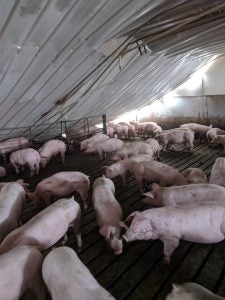Last year, the American Farm Bureau Federation and National Pork Producers Council petitioned the U.S. Supreme Court to take their case against California’s Proposition 12, which would ban the sale of pork from hogs that don’t meet the state’s production standards. This morning, the Supreme Court said it will review the Ninth Circuit’s decision that supported California’s ballot.
In November 2018, California voters approved Proposition 12, a ballot measure that prohibits the sale of pork that is not produced according to the state’s production standards. Beginning Jan. 1, 2022, Proposition 12 was set to impose unscientific animal housing standards that reach outside of California’s borders to farms across the United States. However, the Sacramento County Superior Court ruled to delay enforcement of Proposition 12 for pork retailers in January. That delay was set to last for 180 days.
The National Pork Producer Council and the American Farm Bureau Federation, both of which have been been very vocal on this issue, will file their initial brief in the coming weeks with the U.S. Supreme Court, which could hear oral arguments in the fall and could render a decision by the end of the year.
» Related: LA Times’ applause for Prop 12 is nothing short of anti-animal agriculture activism
According to the National Pork Producer Council, California doesn’t have any significant commercial hog production. Yet they are seeking to regulate how farmers across the country operate, imposing onerous regulations, inspection and permitting requirements, and highly prescriptive measures on livestock farmers. Currently, less than one percent of U.S. pork production meets Proposition 12 requirements, a troubling statistic since California represents 15 percent of the U.S. pork market.
Industry estimates for converting sow barns or building new ones to meet the Prop 12 standards are in the billions of dollars, with consumers bearing the ultimate cost through higher pork prices.
Former NPPC President Jen Sorenson said, “In this case, arbitrary animal housing standards that lack any scientific, technical, or agricultural basis and that will only inflict harm on U.S. hog farmers.”

American Farm Bureau Federation President Zippy Duvall said, “AFBF is pleased with the Supreme Court’s decision to consider the constitutionality of California’s law imposing arbitrary requirements on farmers well outside its borders. We share California’s goal of ensuring animals are well cared for, but Prop 12 fails to advance that goal. We look forward to presenting the facts to the Court, including how Prop 12 hamstrings farmers’ efforts to provide a safe environment for their animals, while harming small family farms and raising pork prices across the country. One state’s misguided law should not dictate farming practices for an entire nation.”
The California Department of Food and Agriculture admitted the initiative will have no effect on food safety and actually will increase the mortality rate for sows subject to it.
Generally, the Dormant Commerce Clause in the United States grants Congress the power to regulate trade among the states and restricts states from regulating commerce outside their borders, except for matters related to public health and safety.
The opposing side, including the Humane Society of the United States, reiterated its position after the high court’s announcement. Kitty Block CEO of the Humane Society of the United States said, “We are confident the Supreme Court will uphold California’s landmark farm animal protection law. The Court has repeatedly affirmed the states’ rights to enact laws protecting animals, public health and safety, and the pork industry should focus on eliminating cruel caging of animals rather than attacking popular, voter-passed animal cruelty laws.”
Wayne Pacelle, a former HSUS CEO who resigned in 2018 amid multiple sexual harassment allegations, is now president of the Center for a Humane Economy and Animal Wellness Action. He said in a statement Monday: “Since there are no federal laws to protect animals on the farm, a Supreme Court ruling adverse to California would leave farm animals with no protections at all — not at the local, state, or federal level. The fate of farm animals would rest entirely in the hands of agribusiness companies that have pioneered and practiced extreme confinement of farm animals and made those forms of exploitation routine.”
No matter what, animal-rights activists will likely never be satisfied as long as animal agriculture still exists. In fact, PETA does not support the passage of Prop 12 because eggs can still be sold under the new law if they are cage-free. The group said that the proposition was a “step backwards” because it does not achieve close to what it has tumultuously fought to accomplish.
“We are extremely pleased that the Supreme Court will consider the constitutionality of Proposition 12, in which California seeks to impose regulations targeting farming practices outside its borders that would stifle interstate and international commerce,” said current NPPC President Terry Wolters. “NPPC has poured a lot of blood, sweat and tears into preserving the rights of America’s pork producers to raise hogs in a way that’s best for their animals’ well-being and that allows them to continue selling pork to all consumers, both here and internationally.”
The nine-member U.S. Supreme Court is considered to have six conservative-leaning members and three liberal-leaning members.


